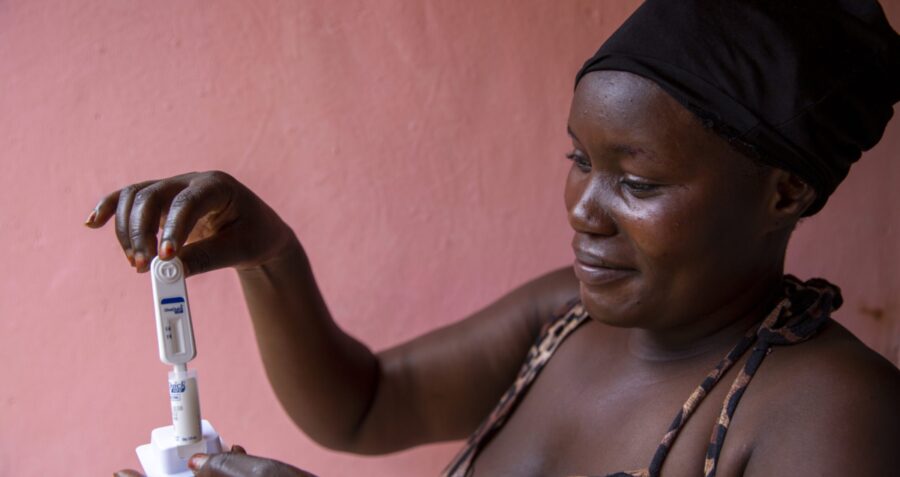20 million lives: The real consequences of the Global Fund shortfall
 ©Frontline AIDS/Karel Prinsloo/Arete/2022
©Frontline AIDS/Karel Prinsloo/Arete/2022
The 2022 Global Fund Replenishment is still short of its US$18 billion target
The global fight against HIV/AIDS, tuberculosis (TB) and malaria was dealt a blow this week with the news that the Global Fund Seventh Replenishment is still short of its US$18 billion target. While it is the largest amount ever raised for a multilateral health organisation, and the largest amount by the Global Fund, it falls below the minimum required to get the world back on track toward ending the three main infectious killer diseases; building resilient and sustainable systems for health; and strengthening pandemic preparedness to make the world more equitable and safer from future threats. The failure to meet this target will dramatically slow, or even reverse, the progress made on eradicating the three diseases.
However, with the United Kingdom and Italy yet to put a figure on their pledges, we are hopeful that these key donors will follow countries — from the US, Japan and Ireland to South Africa, Cote d’Ivoire and Uganda — in increasing their 2019 commitment by 30%. With the UK having hosted the first ever Global Fund replenishment in 2005, Frontline AIDS is urging the Government to uphold its historical commitment to ending AIDS and contribute its fair share to the US$18 billion target to save 20 million more lives.
Since U.S. law limits their funding to one-third of total contributions from all donors to the Global Fund, the UK decision will have a multiplier effect. A reduced UK pledge would mean $1.3bn of potential US contributions would be removed from the table, leading to 1.5 million lives being endangered and 28 million people contracting new infections.
“Twenty years ago, the world came together to tackle three deadly epidemics. Since then, the Global Fund has enabled partners to save over 50 million lives. Against this backdrop of success, not meeting the full replenishment goal in 2022 feels like a huge step backwards,” said Christine Stegling, Executive Director of Frontline AIDS. “As an international community we cannot allow ourselves to lose momentum. Now is the time to be investing in innovative, community-led responses, to reduce deaths and new infections and to adequately respond to future pandemics.”
According to the latest UNAIDS data report, 1.5 million people acquired HIV in 2021 and 650,000 died of AIDS-related causes. Evidence increasingly suggests that this is because resources available for HIV in low- and middle-income countries are declining, leaving their HIV responses US$ 8 billion short of the amount needed by 2025. More than 70% of the new infections in 2021 were among people from key populations – including people who inject drugs, sex workers, prisoners and men who have sex with men – and their partners. In Sub-Saharan Africa, adolescent girls and young women continue to be extremely vulnerable to HIV infection, accounting for six in every seven new HIV infections among young people aged 15–19.
The Global Fund’s new Strategy sets ambitious goals to build on its successes and end HIV as a public health threat by 2030. Frontline AIDS partners are vital contributors to these achievements. In South Africa, our partner NACOSA has reached 48,000 adolescent girls and young women, 44,000 sex workers and 11,000 people who use drugs with a comprehensive package of HIV prevention clinical, psychosocial, human rights services. In India, the Vihaan programme, managed by Alliance India, is implemented through a diverse partnership with the government, civil society, and the networks of people living with HIV In India, the Vihaan programme, managed by Alliance India, is implemented through a diverse partnership with the government, civil society, and the networks of people living with HIV. Their 310 care and support centres serve nearly 1.3 million people living with HIV. These programmes will witness the very real consequences of the funding shortfall and populations that are marginalised will not receive vital services.
“After the devastating impact COVID-19 has had on global health, it is more important than ever that high-income countries play their part in defeating HIV, TB and malaria”, said Christine Stegling. “Sustaining success depends on contributions to the Global Fund and all of us standing shoulder to shoulder to fight for what counts.”
Tags
Adolescent girls and young womenAlliance IndiaHIV preventionNACOSAThe Global FundTuberculosis (TB)

